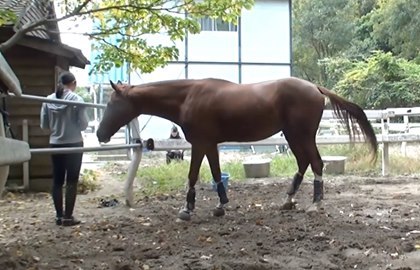mooseings: mievzar-equus:Study: Horses Ask Humans for Help With Unsolvable TasksTheHorse.com |
mooseings: mievzar-equus: Study: Horses Ask Humans for Help With Unsolvable Tasks TheHorse.com | 20 December, 2016 Last summer, European scientists confirmed what we’ve all suspected—horses try to communicate with us. Now, a group of scientists in Japan has gone a step further. Their new study shows that they even try to tell us things they think we don’t know ourselves. In other words, it’s no longer just, “Hey, Favorite Human. Can I have that carrot in your hand?” It’s more like, “Hey Favorite Human. You don’t know it, but there’s a carrot in that bucket. And if you ask me, it has my name on it….” Horses will use eye contact and touching to try to “tell” humans that food has been hidden, if they think the human didn’t see it being hidden, said Monamie Ringhofer, PhD, of the Graduate School of Intercultural Studies at Kobe University, in Japan. “It was clear that they wanted to teach the human that there was food in a place that the human didn’t know about, and that they wanted to ask for help in getting it,” Ringhofer said. In their two-part study of eight Thoroughbred horses from the Kobe University Equestrian Club, Ringhofer and fellow researcher Shinya Yamamoto, PhD, associate professor at Kobe University, observed horses’ reactions to food being hidden in a covered bucket. At first, horses stood alone in a paddock where they could see two buckets just out of their reach. Then a familiar caretaker stood next to the paddock, reading a book and ignoring the horse. After a minute, the caretaker left, and an assistant came up and showed a carrot to the horse before placing it in one of the buckets and covering it up. The assistant left, and the caretaker (theoretically unaware that there’s a carrot in one of the buckets) returned, still reading the book. The second part of the experiment was similar, except that this time, the caretaker stayed next to the paddock when the assistant came with the carrot. This way the caretaker could see that the carrot was placed in a bucket and covered up. Ringhofer and Yamamoto found that in both parts of the experiment, the horses tried to communicate with the caretaker about the hidden carrot, by looking at and touching the caretaker. However, the horses were much more active about looking and touching the caretaker in the first part of the experiment, when the caretaker “didn’t know” about the carrot, they said. “There was a very obvious difference in the horses’ behavior when they thought the caretaker didn’t know about the food,” Ringhofer told The Horse. “There was much more effort on their part to communicate to her not only that he wanted the food, but that there actually was food in one of the buckets.” Before the European study on horses communicating with humans, researchers had previously looked at how aware horses are of humans’ attentional state and subtle communication tactics like eye gazing and pointing. While those studies showed that horses are capable of picking up such signals, Ringhofer said her study indicates horses seem to be capable of much more. “Our study suggests that horses may possess a more advanced cognitive ability,” she said. “We show that it is possible that horses are sensitive to humans’ past attentional state, and that they can alter their signaling behavior accordingly.” Ringhofer’s study shifts to a different point of view of human-horse communication, looking into the ways horses make the effort to communicate with us, instead of the contrary. “It’s important to know how horses read us, but I also wanted to know how horses send signals to humans, because that’s also important!” she said. “Horses sometimes hide their feelings, but I want to find out what they have inside their minds. And that’s the overall theme of my continuous research: Why is it that horses become so close in their relationships with us, and what is their underlying interspecies social behavior?” The study, “Domestic horses send signals to humans when they face with an unsolvable task,” will appear in an upcoming issue of Animal Cognition. This is so COOL -- source link
Tumblr Blog : thescienceofequus.tumblr.com

